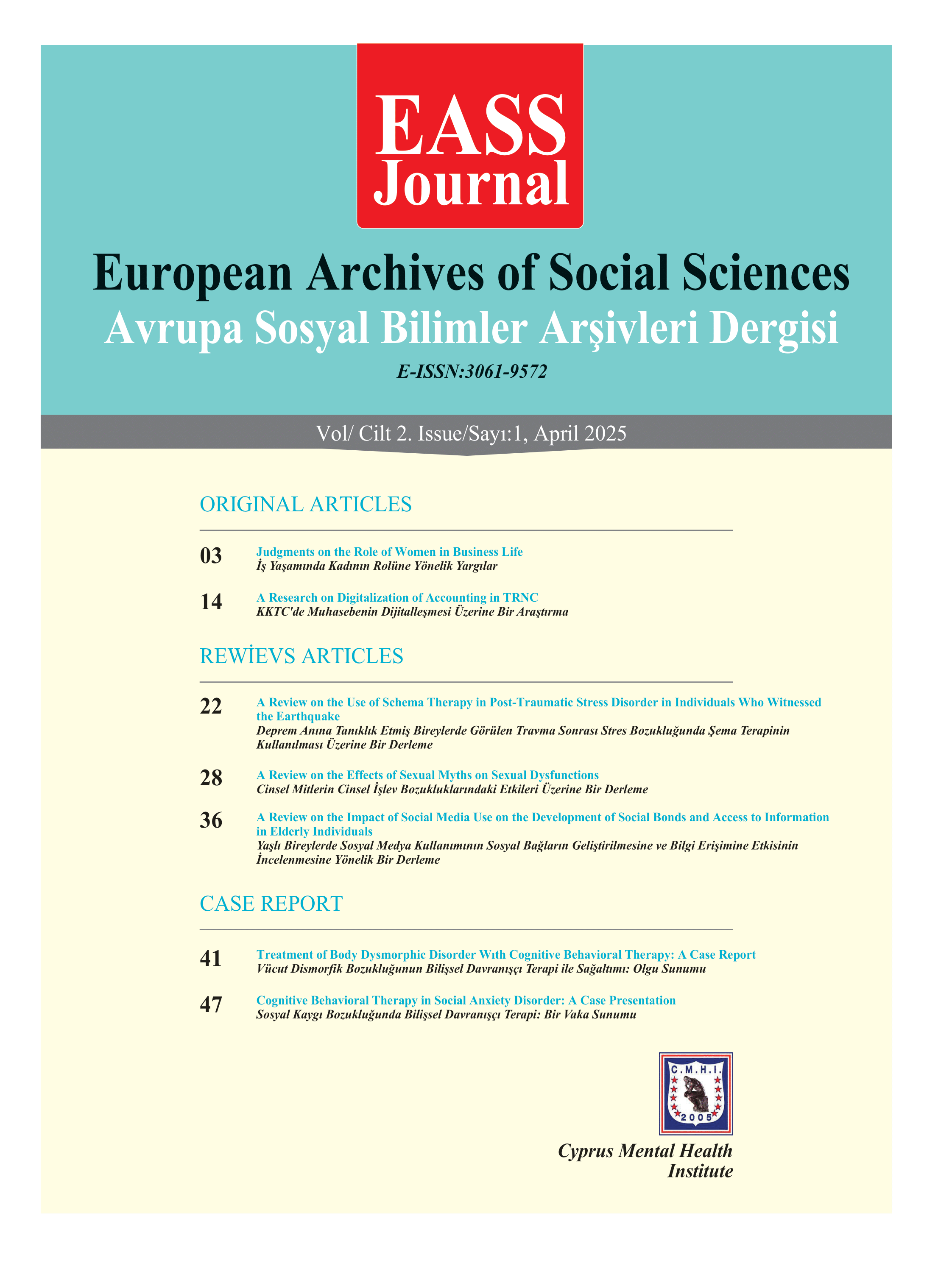Cognitive Behavioral Therapy in Social Anxiety Disorder: A Case Presentation
DOI:
https://doi.org/10.35365/eass.25.2.07Keywords:
Cognitive Behavioral Therapy, Social Anxiety Disorder, Thematic Apperception Test, Social Skills Development StrategiesAbstract
This study evaluates the process and outcomes of Cognitive Behavioral Therapy (CBT) for a client diagnosed with Social Anxiety Disorder (SAD). The client’s challenges, emotional states, and behaviors in social environments from childhood through adolescence are examined in detail. During the CBT process, strategies such as thought awareness, cognitive restructuring, and social skills development were employed. At the beginning and throughout the therapy, projective assessment tools like the Thematic Apperception Test (TAT) were utilized to analyze the client’s inner world and formulate an effective treatment plan. As a result of the therapeutic process, significant reductions in the client’s social anxiety symptoms were observed, along with more positive experiences in social interactions. The findings support the effectiveness of CBT as a treatment method for social anxiety disorder. However, considering the study’s limitations, further research involving larger populations and long-term follow-ups is recommended.
References
Akkuş, K. (2024). Sosyal Kaygı Bozukluğunun Bilişsel Davranışçı Terapisi: Kapsamlı Bir Gözden Geçirme. Mediterranean Journal of Humanities, 14, 311-327. https://doi.org/10.13114/mjh.1476738
Kahveci Öncü, B., & Baştuğ, B. (2022). Klinik ve adli bağlamda ruhsal travmanın değerlendirilmesinde Minnesota Çok Yönlü Kişilik Envanteri, Tematik Algı Testi ve Rorschach Mürekkep Lekeleri Testi’nin kullanımı. Journal of Clinical Psychology Research, 6(2), 232-248. https://doi.org/10.5455/kpd.26024438m000063
Binbay, Z., & Koyuncu, A. (2012). Sosyal Anksiyete Bozukluğu ve Duygudurum Bozuklukları Birlikteliği. Psikiyatride Güncel Yaklaşımlar - Current Approaches in Psychiatry, 4(1), 1-13. https://doi.org/10.5455/cap.20120401
Dilbaz, N. (2000). Sosyal Anksiyete Bozukluğu: Tanı, Epidemiyoloji, Etiyoloji, Klinik ve Ayırıcı Tanı. Klinik Psikiyatri, 3 (2), 3-21.
Fıstıkcı, N., Keyvan, A., Erten, E., Duran, Ş., & Sungur, M. Z. (2015). Sosyal Anksiyete Bozukluğunda Bilişsel Davranışçı Terapi: Güncel Kavramlar. Psikiyatride Güncel Yaklaşımlar, 7(3), 229-243. https://doi.org/10.5455/cap.20140719110703
Gök, B. G., & İnözü, M. (2023). Sosyal Kaygı Bozukluğu: Mevcut yaygınlık, eştanı ve bozulma durumu. Journal of Clinical Psychology Research, 7(3), 448-467. https://doi.org/10.5455/kpd.26024438m000101
Muhtar, G., & Çakmak Tolan, Ö. (2021). Sosyal anksiyete bozukluğu olan yetişkinlerde bilinçli farkındalık temelli müdahalelerin etkililiği: Sistematik bir gözden geçirme. Psikoloji Çalışmaları - Studies in Psychology, 41(2), 427–458. https://doi.org/10.26650/SP2020-847371
Öztürk, A. (2014). Sosyal Kaygıyı Açıklayan Yaklaşımlar. Elektronik Sosyal Bilimler Dergisi, 13(48), 15-26. https://doi.org/10.17755/esosder.86289
Soylu, C., & Topaloğlu, C. (2015). Bilişsel Davranışçı Terapide Ev Ödevi Uygulamaları. Psikiyatride Güncel Yaklaşımlar, 7(3), 280-288.
Yalçın, M., & Sütcü, S. (2016). Yetişkinlerde sosyal fobinin tedavisinde bilişsel davranışçı grup terapisinin etkililiği: Sistematik bir gözden geçirme. Psikiyatride Güncel Yaklaşımlar, 8(Ek 1), 61-78. https://doi.org/10.18863/pgy.28154
Yüksel, A. (2024). Sosyal Fobinin Bilişsel Davranışçı Terapi Çerçevesinde Vaka Formülasyonu. Türkiye Bütüncül Psikoterapi Dergisi, 7(14), 65-71. https://doi.org/10.56955/bpd.1498818
Downloads
Published
How to Cite
Issue
Section
License
Copyright (c) 2025 Emin Doğukan Çelikel, Doç. Dr. Meryem Karaaziz

This work is licensed under a Creative Commons Attribution 4.0 International License.









 The journal is licensed under a
The journal is licensed under a 